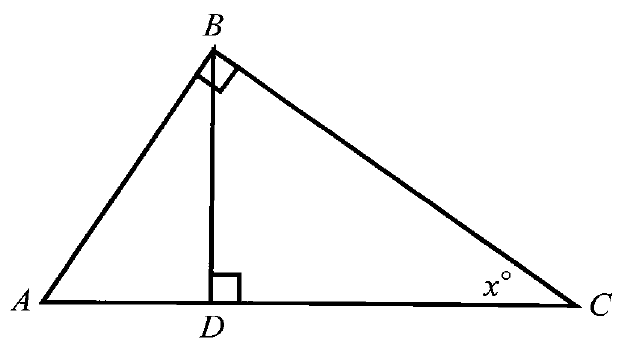PROPORTIONS AND SIMILAR TRIANGLES
Triangle Proportionality Theorem
If a line parallel to one side of a triangle intersects the other two sides, then it divides the two sides proportionally.
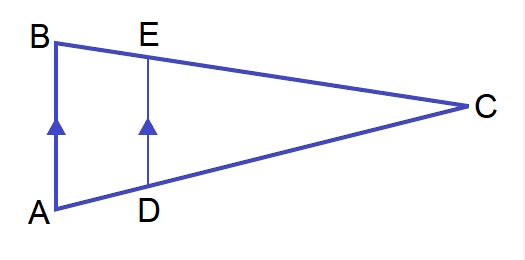
In the diagram above,
if DE ∥ AB, then CE/EB = CD/DA
Converse of the Triangle Proportionality Theorem
If a line divides two sides of a triangle proportionally, then it is parallel to the third side.
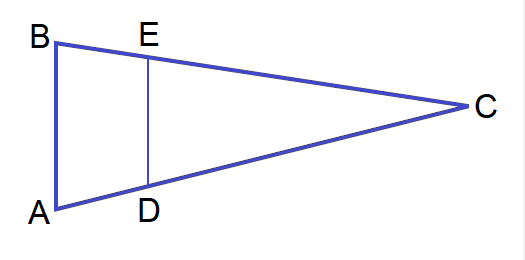
In the diagram above,
if CE/EB = CD/DA, then DE ∥ AB
Theorems on Proportionality
Theorem 1 :
If three parallel lines intersect two transversals, then they divide the transversals proportionally.
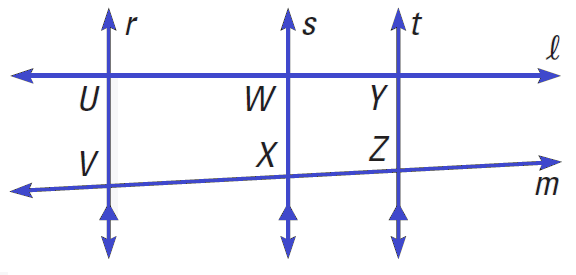
In the diagram above,
if r ∥ s and s ∥ t, and l and m intersect r, s and t, then
UW/WY = VX/XZ
Theorem 2 :
If a ray bisects an angle of a triangle, then it divides the opposite side into segments whose lengths are proportional to the lengths of the other two sides.
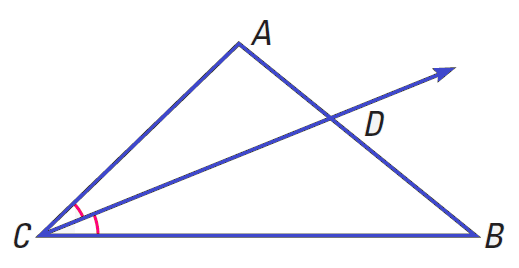
If CD bisects ∠ACB, then AD/DB = CA/CB.
Finding the Length of a Segment
Example 1 :
In the diagram shown below
PQ ∥ ST, QS = 8, SR = 4 and PT = 12
Find the length of TR.
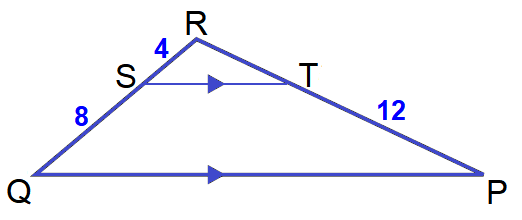
Solution :
By Triangle Proportionality Theorem,
SR/QS = TR/PT
Substitute.
4/8 = TR/12
Simplify.
1/2 = TR/12
Multiply both sides by 12.
12 ⋅ (1/2) = (TR/12) ⋅ 12
6 = TR
So, the length of TR is 6 units.
Example 2 :
In the diagram shown below KL ∥ MN, find the values of the x and y.
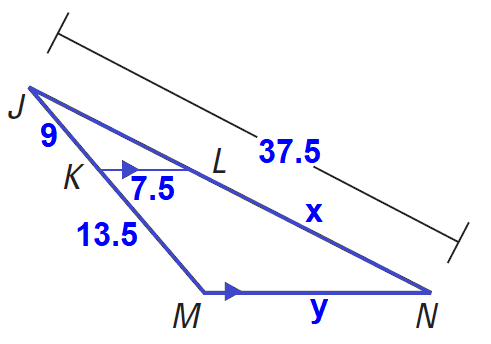
Solution :
Finding the value of x :
To find the value of x, we can set up a proportion.
Write proportion.
9/13.5 = (37.5 - x)/x
By cross product property of proportion,
9x = 13.5(37.5 - x)
9x = 506.25 - 13.5x
Add 13.5x to both sides.
22.5x = 506.25
Divide both sides by 22.5.
x = 22.5
Finding the value of y :
Since KL ∥ MN and ΔJKL ∼ ΔJMN,
JK/JM = KL/MN
JK/(JK + KM) = KL/MN
9(9 + 13.5) = 7.5/y
9/22.5 = 7.5/y
By cross product property of proportion,
9y = 7.5 ⋅ 22.5
9y = 168.75
Divide both sides by 9.
y = 18.75
Determining Parallels
Example 3 :
In the diagram shown below, determine whether MN ∥ GH.
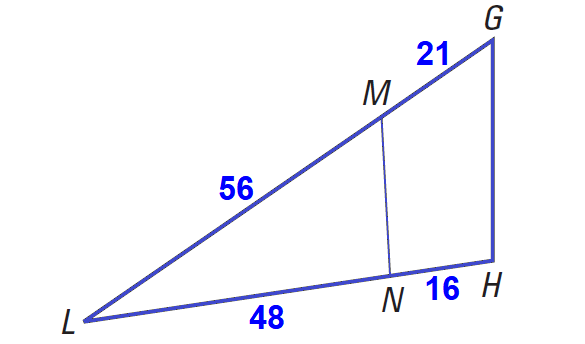
Solution :
Begin by finding and simplifying the ratios of the two sides divided by MN.
LM/MG = 56/21 = 8/3
LN/NH = 48/16 = 3/1
Because 8/3 ≠ 3/1, MN is not parallel to GH.
Using Proportionality Theorems
Example 4 :
In the diagram shown below,
∠1 ≅ ∠2 ≅ ∠3
PQ = 9, QR = 15 and ST = 11
Find the length of TU.
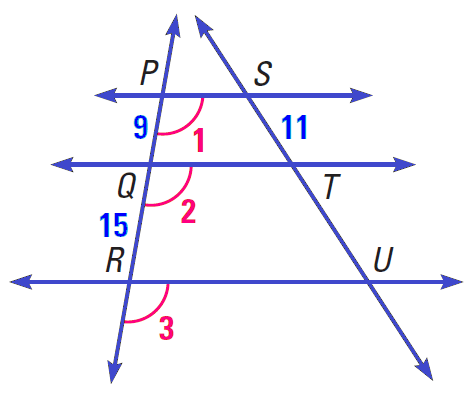
Solution :
Because corresponding angles are congruent the lines are parallel and we can use Theorem 1 on Proportionality.
Parallel lines divide transversals proportionally.
PQ/QR = ST/TU
Substitute.
9/15 = 11/TU
Simplify.
3/5 = 11/TU
By reciprocal property of proportion,
5/3 = TU/11
Multiply both sides by 11.
11 ⋅ (5/3) = (TU/11) ⋅ 11
55/3 = TU
So, the length TU is 55/3 or 18⅓ units.
Example 5 :
In the diagram shown below, ∠CAD ≅ ∠DAB. Use the given side lengths to find the length of DC.
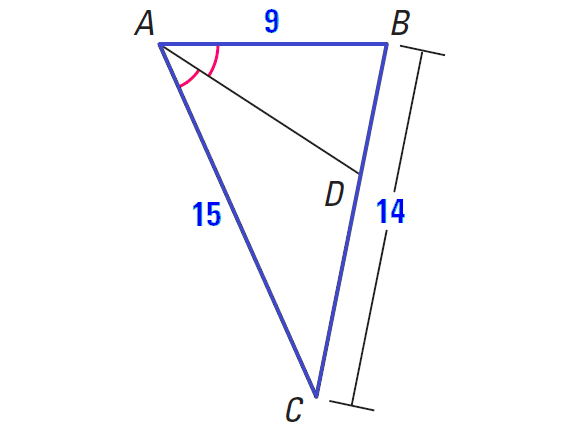
Solution :
Since AD is an angle bisector of ∠CAB, we can apply Theorem 2 on Proportionality.
Let x = DC.
Then,
BD = 14 - x
Apply Theorem 2 on Proportionality.
AB/AC = BD/DC
Substitute.
9/15 = (14 - x)/x
3/5 = (14 - x)/x
Multiply both sides by 5x.
5x ⋅ (3/5) = [(14 - x)/x] ⋅ 5x
3x = 70 - 5x
Add 5x to each side.
8x = 70
Divide both sides by 8.
x = 8.75
Hence, the length of DC is 8.75 units.
Using Proportionality Theorems in Real Life
Example 6 :
We are insulating your attic, as shown. The vertical 2 x 4 studs are evenly spaced. Explain why the diagonal cuts at the tops of the strips of insulation should have the same lengths.
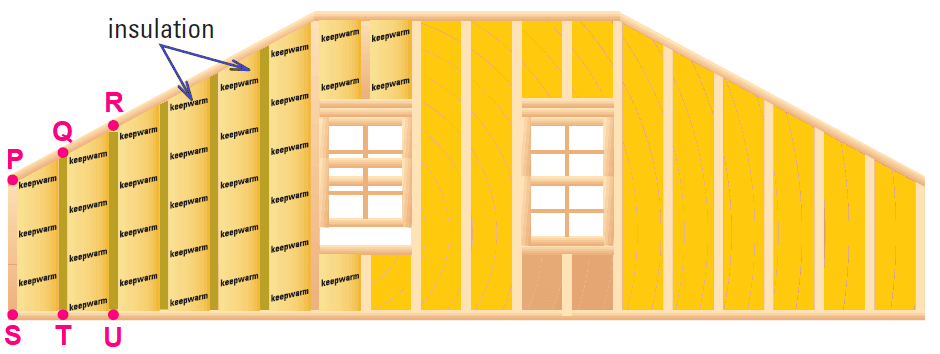
Solution :
Because the studs AD, BE and CF are each vertical, we know that they are parallel to each other. Using Theorem 8.6, you can conclude that
DE/EF = AB/BC
Because the studs are evenly spaced, we know that
DE = EF
So, we can conclude that
AB = BC
which means that the diagonal cuts at the tops of the strips have the same lengths.
Kindly mail your feedback to v4formath@gmail.com
We always appreciate your feedback.
©All rights reserved. onlinemath4all.com
Recent Articles
-
Digital SAT Math Problems and Solutions (Part - 144)
Apr 14, 25 07:27 PM
Digital SAT Math Problems and Solutions (Part - 144) -
Quadratic Equation Problems with Solutions (Part - 1)
Apr 14, 25 11:33 AM
Quadratic Equation Problems with Solutions (Part - 1) -
Quadratic Equation Problems with Solutions (Part - 2)
Apr 14, 25 11:22 AM
Quadratic Equation Problems with Solutions (Part - 2)
